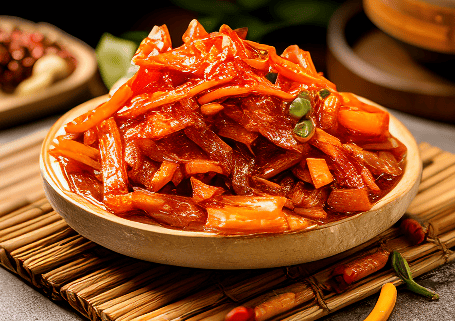“A person old in years does not talk idly; health is the key to achievement.” This saying is widely circulated among our older generation, emphasizing the importance of paying attention to diet as one ages, and not eating indiscriminately. Today, let’s talk about the “red-light zones” that elderly people over 65 should avoid at the dining table and why they prefer to eat warm steamed buns and have a bowl of plain congee rather than easily touching those “forbidden areas.”
Highly flavored dishes, the “invisible killer” of heart, liver, spleen, lungs, and kidneys
“Excessive salt leads to loss, excessive oil harms the body.” This statement is particularly relevant to the elderly. Foods high in salt, sugar, and oil are like “red lights” on the dinner table—seemingly attractive but actually harboring hidden dangers.
Pickled vegetables, preserved foods: These foods, high in salt content, can easily lead to hypertension with long-term consumption, increase the burden on the heart, and affect blood circulation. Traditional Chinese medicine emphasizes the principle of “five flavors entering the five organs,” and excessive salt can harm the kidneys. For elderly people whose kidney qi gradually weakens, it is best to eat such foods sparingly.
Desserts, candies: Sweet foods may temporarily uplift mood, but excessive intake can raise blood sugar levels, increase the risk of diabetes, and also affect spleen and stomach function, leading to indigestion. As stated in the book “Huangdi Neijing,” “Sweet walks with meat; overdosing on sweets will lead to bone pain and hair loss.” This indicates that excessive sweet consumption can damage bones and hair, with particular caution needed among the elderly.
Fried foods: Greasy foods are difficult to digest; for the elderly whose gastrointestinal functions are weakened, excessive consumption can lead to bloating, constipation, and other issues. In the ancient text “Qian Jin Yao Fang,” it is advised to “rinse the mouth with water several times after eating to keep the teeth from decay and the mouth fresh.” This suggestion is not only for oral hygiene but also advocates a light diet.
Cold and hard foods, the “major enemies” of the spleen and stomach
“Cold and hard foods are the greatest challenge to the spleen and stomach.” This statement is frequently mentioned in traditional Chinese health preservation. For the elderly, whose spleen and stomach functions are declining, the stimulation from cold and hard foods undoubtedly worsens their condition.
Cold foods: such as ice cream, chilled beverages, and sashimi, containing heavy cold properties that may injure the spleen and stomach yang, leading to abdominal pain and diarrhea. Traditional Chinese medicine preaches “coldness causes stagnation,” and for the elderly with deficient yang qi, they should steer clear of cold foods.
Hard foods: Nuts, fried snacks, while rich in nutrients, their hard texture makes them difficult to chew and digest, potentially causing damage to the teeth and gastric mucosa. With loosening teeth and weakened digestion function in the elderly, the food choices should prioritize soft and easily digestible options.
High cholesterol, the “time bomb” for blood vessels
“Blocked blood vessels breed myriad diseases.” With advancing age, blood vessel elasticity decreases, lipid metabolism slows down, making high-cholesterol foods a looming threat to the elderly’s health.
Animal offal, egg yolks: Although these foods are nutrient-rich, they also carry high cholesterol content. Prolonged excessive intake can elevate blood lipids, increase the risk of atherosclerosis and cardiovascular diseases. Traditional Chinese medicine emphasizes the balance of “qi and blood,” excessive blood lipids lead to viscous blood, hampering overall qi and blood circulation.
Fatty meats, butter: Also categorized as high-fat, high-cholesterol foods, the elderly should try to avoid or consume in moderation. Maintaining a light diet, focusing on foods rich in dietary fiber, helps lower blood lipids and protect vascular health.
“Food is the paramount necessity of the people; food safety comes first.” For individuals over 65 years old, eating healthily is the best self-care. While steamed buns and plain congee may seem simple, they embody the taste of home and the wisdom of health. While enjoying delicious food, it wouldn’t hurt to listen more to the doctor’s advice, set up a “red-green light” system at your dining table, ensuring that health and deliciousness go hand in hand.


